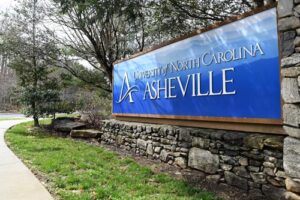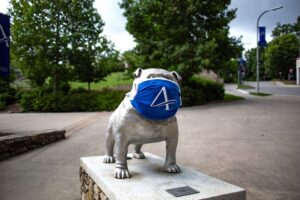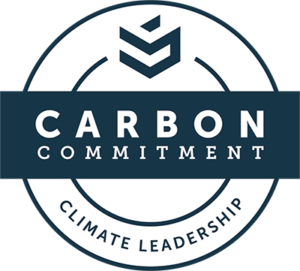Climate Action During a Pandemic

 My passion for environmental science began in high school. I took an Environmental Science course and immediately fell in love. I have since explored the many complexities and nuances of sustainability. I’ve worked on composting and residential sustainability campaigns, I’m a GIS intern at the National Environmental Modeling and Analysis Center doing climate resilience work, I’ve taken ecology and chemistry classes at the University of North Carolina Asheville, and I’ve helped organize trash cleanups in local streams. These are all experiences that I hold close to my heart, as they have informed my values and opinions regarding climate action.
My passion for environmental science began in high school. I took an Environmental Science course and immediately fell in love. I have since explored the many complexities and nuances of sustainability. I’ve worked on composting and residential sustainability campaigns, I’m a GIS intern at the National Environmental Modeling and Analysis Center doing climate resilience work, I’ve taken ecology and chemistry classes at the University of North Carolina Asheville, and I’ve helped organize trash cleanups in local streams. These are all experiences that I hold close to my heart, as they have informed my values and opinions regarding climate action.
 My most recent endeavor, however, has looked really different from my previous ones. I am currently working with a small team at UNC Asheville to develop a Climate Action Plan and eventually sign onto the Second Nature Carbon Commitment. Signing this commitment means setting a plan and an intention for UNC Asheville to be carbon neutral by 2050. Through climate action in every department and in every position, our campus can organize and mitigate climate change with continuity and great impact. Doing this work has looked different for a lot of reasons, but since it’s 2020 I imagine you can guess what the big one is…
My most recent endeavor, however, has looked really different from my previous ones. I am currently working with a small team at UNC Asheville to develop a Climate Action Plan and eventually sign onto the Second Nature Carbon Commitment. Signing this commitment means setting a plan and an intention for UNC Asheville to be carbon neutral by 2050. Through climate action in every department and in every position, our campus can organize and mitigate climate change with continuity and great impact. Doing this work has looked different for a lot of reasons, but since it’s 2020 I imagine you can guess what the big one is…
 This work began as a class final project in a Communicating Climate Change course. Along with a few other students, I drafted a Climate Action Plan that details the potential actions our school can take to mitigate our carbon footprint. We started working on the project in February, beginning with research in different areas of campus affairs. I was tasked with exploring how to make our buildings more sustainable, while others looked at food, transit, water, land usage, and energy. When the pandemic hit and we needed to work entirely online, we decided, as a group, to continue putting effort and time into this project despite the evident challenges. We met virtually once or twice a week, and each dedicated a couple of hours to the project. I don’t think my email has ever been so vital to a project before this. We had group chats and Zoom calls and a lot of late nights. It was exhausting, but we all put forth our best effort. Our goal was to have a finalized draft of the Climate Action Plan by the end of the semester. This would make it easier to persuade campus administration to sign onto the Carbon Commitment, as one of the major steps would already be completed. By staying in close contact with each other and providing support when needed, we managed to get a decent draft by May.
This work began as a class final project in a Communicating Climate Change course. Along with a few other students, I drafted a Climate Action Plan that details the potential actions our school can take to mitigate our carbon footprint. We started working on the project in February, beginning with research in different areas of campus affairs. I was tasked with exploring how to make our buildings more sustainable, while others looked at food, transit, water, land usage, and energy. When the pandemic hit and we needed to work entirely online, we decided, as a group, to continue putting effort and time into this project despite the evident challenges. We met virtually once or twice a week, and each dedicated a couple of hours to the project. I don’t think my email has ever been so vital to a project before this. We had group chats and Zoom calls and a lot of late nights. It was exhausting, but we all put forth our best effort. Our goal was to have a finalized draft of the Climate Action Plan by the end of the semester. This would make it easier to persuade campus administration to sign onto the Carbon Commitment, as one of the major steps would already be completed. By staying in close contact with each other and providing support when needed, we managed to get a decent draft by May.
When the semester ended and our CAP was complete, I realized that I missed the project with its collaboration and real-world implications of it. I missed the great team I was working with and their perceptive insights into campus climate action. And so, I applied to and was accepted in the nationwide Rachel Carson Council Fellowship Program to continue doing work on the Carbon Commitment at UNC Asheville.
Now it’s October, and we are still here. Since we no longer need to do the work for a class, the group looks a little different, but the push for UNC Asheville to sign the Carbon Commitment is stronger than ever. Our current group consists of a Climate Analyst through our Student Environmental Center, the Co-Directors of Sustainability on campus, the professor who initiated the project back in February, a few of the students from the original group, and myself. Peripherally, many other students, staff, and faculty are involved with this work through doing research, providing feedback, or voicing their support for the Carbon Commitment to other students and staff. By attending virtual meetings and emailing with student organizations and student government, and by putting forth consistent effort into this project, we have been able to begin some of our climate action items on campus and include other students and staff on the project. By collaborating across campus and working as a team, we have been able to dig deep into the university’s data and plans to improve our Climate Action Plan. Most importantly, we have been able to form relationships and connections with people around campus who are willing to help get this work done.
At UNCA, we are trying to prove that climate action is still possible during a global pandemic, regardless of what happens with our political systems. With an increasing movement for racial equity and public safety, it is important to remember the importance of campus climate action’s impact on the community. By doing climate change mitigation work, we are able to prepare and lessen the effects of climate change, which disproportionately affects BIPOC (Black, Indigenous and People of Color) folks and those experiencing low income. This work provides an opportunity for students to have a “real-world” impact on climate change that is not bound by electoral politics or national bureaucracy. In other words, working on the Carbon Commitment gives students agency and flexibility to cater their climate action to their campus’ needs while mitigating its carbon footprint.
 Over 400 universities have signed this commitment and are working to be carbon neutral as we speak. As a student, it’s been a great learning experience to discuss and analyze the ways in which we can take climate action while being able to pursue real solutions on campus – as we will have to do with all of our communities. The Carbon Commitment provides a framework that helps narrow our focus and make us more efficient.
Over 400 universities have signed this commitment and are working to be carbon neutral as we speak. As a student, it’s been a great learning experience to discuss and analyze the ways in which we can take climate action while being able to pursue real solutions on campus – as we will have to do with all of our communities. The Carbon Commitment provides a framework that helps narrow our focus and make us more efficient.
If your university has not yet signed this commitment, it is an excellent option to pursue concrete climate action in your campus community. The community and resources provided by Second Nature are appealing for both students and staff, and the structure of accountability and inspiration that comes from signing the commitment are great for campus organizing. This pandemic has been exhausting, gruesome, and seemingly endless. But through work that relies on collaboration and continued dialogue, such as the Carbon Commitment, we can truly see changes to our system and social infrastructure that make our planet safer, healthier, and more connected.
 Lindsey Nystrom – Rachel Carson Council Fellow
Lindsey Nystrom – Rachel Carson Council Fellow
Lindsey is a junior at the University of North Carolina, Asheville, majoring in Environmental Equity and minoring in American Indian and Indigenous Studies. Her RCC Fellowship project is continuing the divestment campaign and working toward a Climate Commitment at UNCA. [email protected]
![]() The Rachel Carson Council depends on tax-deductible gifts from concerned individuals like you. Please help if you can.
The Rachel Carson Council depends on tax-deductible gifts from concerned individuals like you. Please help if you can.
![]() Sign up here to receive the RCC E-News and other RCC newsletters, information and alerts.
Sign up here to receive the RCC E-News and other RCC newsletters, information and alerts.






